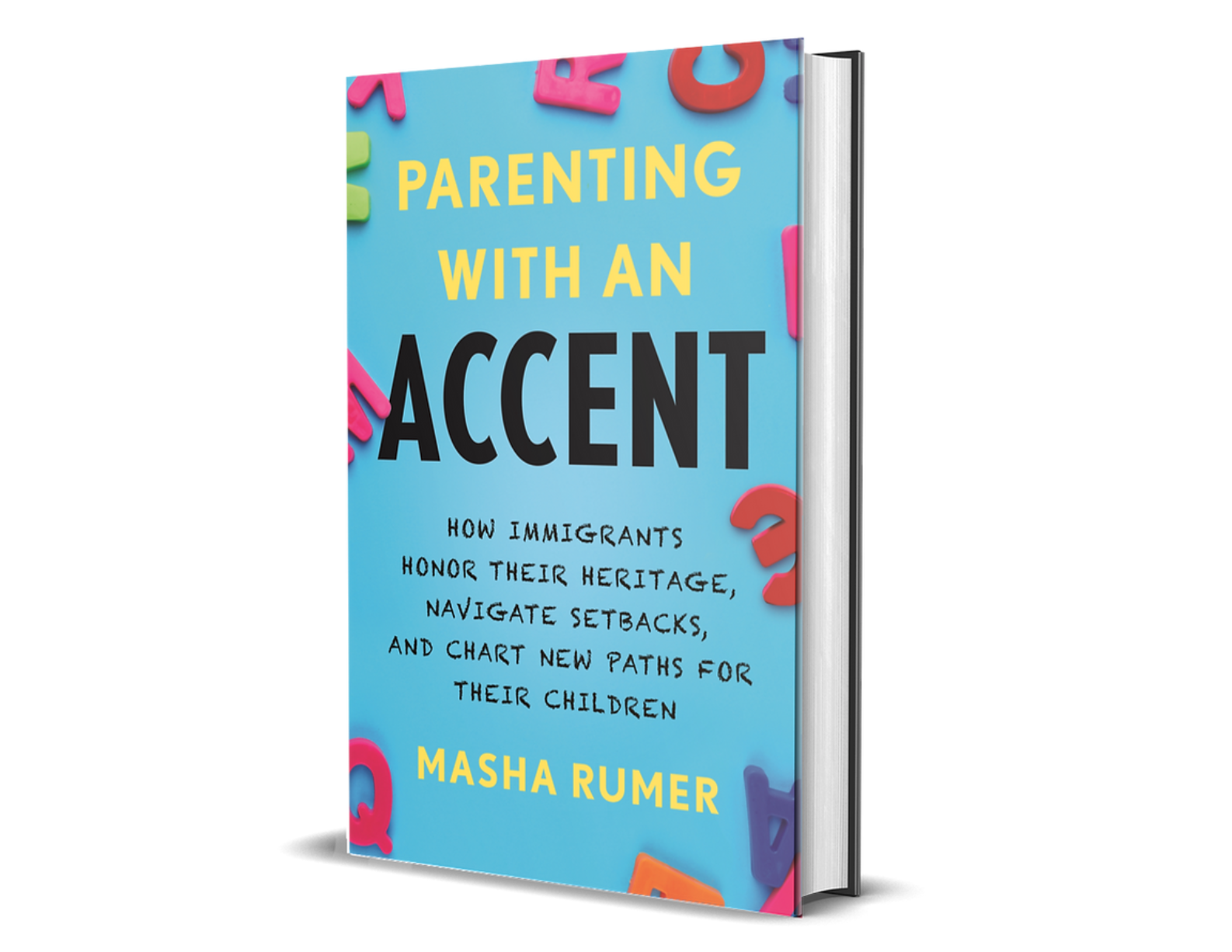
“Parenting With An Accent:” American Immigrants Bring Up Their Kids
Though I am not a parent, I have long been enthralled by parenting memoirs, advice columns, and general child-rearing discourse. My browser history is a testament to how much time I spend lurking on Slate’s Care and Feeding. Even as a non-parent, reading hit parenting books like Bringing Up Bebé and All Joy and No Fun are glimpses into the journey some of my peers have embarked on and the bridge they’ve crossed. How else could I remain smugly convinced that if I had a toddler, they’d never look at a screen and always finish what’s on their plate?
Masha Rumer’s Parenting With An Accent [$24.95, Beacon Press Books] is a refreshing addition to a crowded field, unique in its focuses and perspective: highlighting and amplifying the voices and stories of immigrant parents navigating life in the United States. The book is as much ethnographic study as it is an affirmative and therapeutic examination of identity, and what it means to pass that identity forward. Rumer conducted more than sixty interviews between 2017 and 2020, encountering immigrants “living in fourteen different states and speaking eighteen languages other than English” (xiii).
Rumer’s family immigrated from the former Soviet Union in 1990s, fleeing antisemitic persecution and economic precarity. She experienced a wearingly familiar (and wholly unacceptable) entry into the United States—microaggressions (being told by a stranger to speak English in the grocery store) macroaggressions (a banner hanging in her ESL classroom telling her and her fellow immigrants to ‘go home’), and everything in between.
Rumer recognizes that the desire to “fit in” is contradictory: she wants to feel like an American, while simultaneously understanding that the flat, white, Christian ideal of American domestic life is unreachable by design. “It’s hard to stay mentally present in an unfamiliar world,” she writes. “Nostalgia tethers you to the past; worry pulls you into the future. Many immigrants who arrived as children often report fuzzy recollections of their early experiences, almost as if after a blackout. To make room for the new, you must let go of the old. But what if the old won’t budge? What if the mind perceives memories as intensely as if they’re still real, clinging to your skin, itching your throat?”
When Rumer has children, the question of how Russian (or Jewish, or American, or, or, or) they should be becomes incredibly high-stakes. This is where the parenting part comes in. Rumer has been publishing pieces in outlets from Kveller to Scary Mommy to the New York Times for years, and here she weaves her own thoughts together with the stories she’s collected of dozens of other immigrant parents who hail from every corner of the globe. At stake, for her and others, is navigating “old country” advice, holding onto traditions (particularly surrounding pregnancy and birth) and figuring out language immersion in a new place.
All together, this creates a rich chorus. “As immigrant parents decide whose advice to listen to, one thing is clear,” Rumer muses. “Everyone I talk to is holding on to some vestige of their upbringing or wish they were doing so more. The old and familiar lends an unmistakable stronghold in the new world.”
It is a well-trodden cliché, but a relevant one here: the commonality of the experiences highlighted in Parenting With An Accent are its strength. Parents the world over are more alike than different; immigrant families raising kids in the United States express the same hopes, fears, and reflections to Rumer as she herself reflects on. There are no easy conclusions—which is true of parenting more generally.
Take her conversation with Denis, who came to the United States from Cameroon in his early twenties. “Teaching his languages to his son is a must,” Rumer notes. “He’s fluent in French, English, and Ewondo, a language of Cameroon, and his American wife also knows Japanese. Sometimes, when Denis sits down to watch soccer on TV in Spanish, he’ll have his infant next to him so that he can hear Spanish words too. He also wants to teach his son about family heritage and paying respect to those who have passed, just as he did in Cameroon… At the same time, he hopes to be a more lenient parent than what he’d seen growing up, he tells me.”
If all of these ideas feel overwhelming, Rumer assures the reader, they feel that way for Denis, too. “Maybe there’s no singular “right way” to raise a child of immigrants,” she concludes. “Perhaps there’s no authority figure to say, wait, wait, you’re doing multicultural parenting all wrong. Here, let me show you how to do it right! This uncharted path is a little bit terrifying. But at the same time, it’s incredibly liberating.”
In the end, it’s like any parenting advice book worth its salt: all about leaving space for children to grow from many parts into a whole. “By the time this calendar year is over, my family will have had multiple present-opening ceremonies in different languages, with cookies, latkes, and beet salads, in the company of people who matter,” Rumer writes.
“All of the pieces will fit somehow.”



